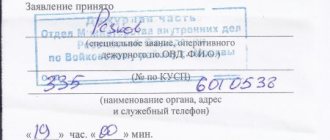Lawyer Spiridonov M.V. 09/20/2015 2 Comments
Criminal proceedings
criminal lawyer, theft from a store, accusation of theft, termination of a criminal case, reconciliation of the parties, Art. 158 Criminal Code of the Russian Federation, Art. 25 Code of Criminal Procedure of the Russian Federation, Art. 76 Criminal Code of the Russian Federation
Many persons brought to criminal liability think about the possibility of terminating the criminal case in connection with the reconciliation of the parties. In this article, using the example of one criminal case from my legal practice, I want to analyze the provisions of the Criminal Procedure Code of the Russian Federation and the Criminal Code of the Russian Federation, reveal the procedure for terminating a criminal case in connection with the reconciliation of the parties, determine whether clarification of the issue of admitting guilt is necessary for terminating a criminal case affairs.
I carried out protection under Part 3 of Art. 30 hours 1 tbsp. 158 of the Criminal Code of the Russian Federation - attempted theft (theft from a store). During the investigation, the defense’s position boiled down to the fact that my principal had paid for part of the goods, but he forgot to pay for part of the purchased goods, so he went through the checkout area, where he was detained by a security guard. As we can see, my client did not admit guilt in committing the crime and actively proved it.
The position on the case agreed upon with the client was to try to dismiss the criminal case without admitting his guilt in the charge.
№ 2:
After the conditions for reconciliation have been reached and fulfilled, it is necessary to take a statement from the victim, in which the latter will reflect that he has reconciled with the person brought to criminal liability, the harm caused to him has been fully compensated, he has no claims against the victim and asks to terminate the criminal case in connection with the reconciliation of the parties. The application must be written in the name of the person in whose proceedings the case is located.
To resolve the issue of terminating a criminal case, it is important to collect as many documents as possible that positively characterize the person brought to criminal liability. Such documents can be a work record, a record book, characteristics from a place of work, study, place of residence, documents confirming the presence of young dependent children, etc.
Is reconciliation possible under Art. 112 of the Criminal Code of the Russian Federation with an outstanding criminal record?
If moderate harm to health is caused with an outstanding criminal record, is it possible to reconcile in court or ask not to be prosecuted?
Lawyer Lebedev Z.S.
Good afternoon According to Article 112 of the Criminal Code, intentional infliction of moderate harm to health, not dangerous to human life and not entailing the consequences specified in Article 111 of this Code, but causing long-term health disorder or significant permanent loss of general working capacity of less than one third, is punishable restriction of freedom for a term of up to three years, or forced labor for a term of up to three years, or arrest for a term of up to six months, or imprisonment for a term of up to three years. The same act committed: a) in relation to two or more persons; b) in relation to a person or his relatives in connection with the performance of official activities by this person or the performance of public duty; c) in relation to a minor or another person who is known to be in a helpless state by the perpetrator, as well as with special cruelty, humiliation or torture for the victim; d) by a group of persons, a group of persons by prior conspiracy or an organized group; e) for hooligan reasons; f) for reasons of political, ideological, racial, national or religious hatred or enmity, or for reasons of hatred or enmity towards any social group; h) with the use of weapons or objects used as weapons - is punishable by imprisonment for a term of up to five years. According to Article 15 of the Criminal Code, depending on the nature and degree of public danger, the acts provided for by this Code are divided into crimes of minor gravity, crimes of medium gravity, serious crimes and especially serious crimes. Crimes of minor gravity are recognized as intentional and careless acts, for the commission of which the maximum punishment provided for by this Code does not exceed three years of imprisonment. Crimes of average gravity are recognized as intentional acts, for the commission of which the maximum penalty provided for by this Code does not exceed five years of imprisonment, and careless acts, for the commission of which the maximum penalty provided for by this Code exceeds three years of imprisonment. Serious crimes are intentional acts for which the maximum punishment provided for by this Code does not exceed ten years of imprisonment. Particularly serious crimes are intentional acts, the commission of which is punishable by this Code in the form of imprisonment for a term of over ten years or a more severe punishment. Taking into account the actual circumstances of the crime and the degree of its public danger, the court has the right, in the presence of mitigating circumstances and in the absence of aggravating circumstances, to change the category of the crime to a less serious one, but not more than one category of crime, provided that for committing the crime specified in part three of this article, the convicted person is sentenced to a sentence not exceeding three years of imprisonment, or another more lenient punishment; for committing a crime specified in part four of this article, the convicted person is sentenced to a punishment not exceeding five years of imprisonment, or another more lenient punishment; for committing a crime specified in part five of this article, the convicted person is sentenced to a punishment not exceeding seven years of imprisonment. According to Articles 75 and 76 of the Criminal Code, a person who has committed a crime of minor or medium gravity for the first time may be released from criminal liability if, after committing the crime, he voluntarily confessed, contributed to the disclosure and investigation of this crime, compensated for damage or otherwise made amends the harm caused by this crime, and as a result of active repentance, ceased to be socially dangerous. A person who has committed a crime of a different category is released from criminal liability only in cases specifically provided for by the relevant articles of the Special Part of this Code. According to Article 318 of the Criminal Procedure Code, criminal cases for crimes specified in part two of Article 20 of this Code are initiated against a specific person by submitting an application to the court by the victim or his legal representative, with the exception of cases provided for in paragraph 2 of part one and part fourth article 147 of this Code. In the event of the death of the victim, a criminal case is initiated by filing an application by his close relative or in the manner established by part three of this article. A criminal case is initiated by an investigator, as well as, with the consent of the prosecutor, by an interrogating officer in cases provided for in part four of Article 20 of this Code. In this case, the investigator begins the preliminary investigation, and the interrogator begins the inquiry. The entry of a prosecutor into a criminal case does not deprive the parties of the right to reconciliation. The application must contain: 1) the name of the court to which it is submitted; 2) a description of the crime event, place, time, as well as the circumstances of its commission; 3) a request addressed to the court to accept the criminal case for proceedings; 3.1) information about the victim, as well as documents proving his identity; 4) information about the person brought to criminal liability; 5) a list of witnesses who must be summoned to court; 6) signature of the person who submitted it. The application is submitted to the court with copies according to the number of persons against whom a criminal case of private prosecution is being initiated. The applicant is warned of criminal liability for knowingly false denunciation in accordance with Article 306 of the Criminal Code of the Russian Federation, about which a note is made in the application, which is certified by the signature of the applicant. At the same time, the magistrate explains to the applicant his right to reconciliation with the person against whom the application was filed. From the moment the court accepts the application for its proceedings, on which a decision is made, the person who filed it is a private prosecutor. The rights provided for in Articles 42 and 43 of this Code must be explained to him, about which a protocol is drawn up, signed by the judge and the person who filed the application. If, after accepting the application for proceedings, it is established that the victim, due to a dependent or helpless state or for other reasons, cannot defend his rights and legitimate interests, then the magistrate has the right to recognize the participation in the case of the legal representative of the victim and the prosecutor as mandatory. According to Part 2 of Article 20 of the Criminal Procedure Code, criminal cases of crimes provided for in Articles 115 part one, 116.1 and 128.1 part one of the Criminal Code of the Russian Federation are considered criminal cases of private prosecution and are initiated only at the request of the victim or his legal representative , except for the cases provided for in part four of this article, and are subject to termination in connection with the reconciliation of the victim with the accused. Reconciliation is allowed before the court retires to the deliberation room to render a verdict, and in the appellate court - before the appellate court retires to the deliberation room to make a decision on the case. Thus, since you have a criminal record, release from criminal liability in connection with active repentance or reconciliation with the victim is not allowed. The case provided for in Part 1 1 or 2 of Article 113 of the Criminal Code, is not investigated in the manner prescribed for cases of private prosecution.
Sincerely, lawyer Zakhar Lebedev, partner of the law firm Antonov and Partners.
Still have questions for your lawyer? Ask them through a special form on the website, or call me by phone in Moscow +7 (499) 288-34-32 or in Samara +7 (846) 212-99-71 (24 hours a day), or come to our office for a consultation (by appointment)!
№ 3:
After receiving these documents, if the criminal case is still at the stage of preliminary investigation, it is necessary to submit a petition to the investigator (inquiry officer) with a request to terminate the criminal case in connection with the reconciliation of the parties. The received statement from the injured party should be added to the case materials. If the application is denied, you can appeal such refusal to the head of the investigative body, the prosecutor or the court, or re-apply it directly when the case is considered in court.
№ 5:
After the criminal case has been submitted to the court and a preliminary hearing has been scheduled, at this stage you can file a motion to dismiss the criminal case in connection with the reconciliation of the parties. Often, courts require the presence of the victim at the court hearing in order to find out his position regarding reconciliation. The law does not contain a requirement for the mandatory presence of the injured party, but it is still better to ensure the appearance of the victim. If the court, at the stage of the preliminary hearing, refuses to terminate the criminal case due to the reconciliation of the parties, then such a petition can be submitted again at the stage of the trial.
Nuances of reconciliation of the parties
What does reconciliation of the parties mean? First, the accused must make a formal apology to the victim. This means that such an action must be performed in front of witnesses, otherwise the victim may even deny that such a thing happened. Secondly, the accused must make amends for all the harm he caused to the victim. This is expressed not only in an apology, but also in compensation for any damage caused. Both material and moral.
note
The amount of compensation that the accused must make to the victim is established not by the responsible authorities, but by the parties to the case themselves. They must discuss the current situation and come to a decision - how much money the one who committed the crime will be obliged to pay. It is important to ensure that the amount of the entire payment is adequate and exactly corresponds to the nature of the case in question and the damage caused.
The second important nuance of reconciliation is the drawing up of a statement by the victims. In it, he is obliged to indicate exactly what actions the accused performed in order for both sides of the case to achieve complete reconciliation. This could be an apology, some kind of compensation payments, an admission of guilt, repentance, and so on.
It is also worth noting that even if all the conditions were met, there was an official reconciliation, and the victim wrote the necessary statement, and agreed on compensation for damage - law enforcement agencies may refuse to close and terminate the case opened against the suspect.
After all, such an action is not their duty, it is their right. They can either satisfy the victim’s application or ignore it, continue the trial, etc. This is done mainly in cases where law enforcement officers involved in the case believe that there are no objective, compelling reasons to release the suspect from criminal liability.






